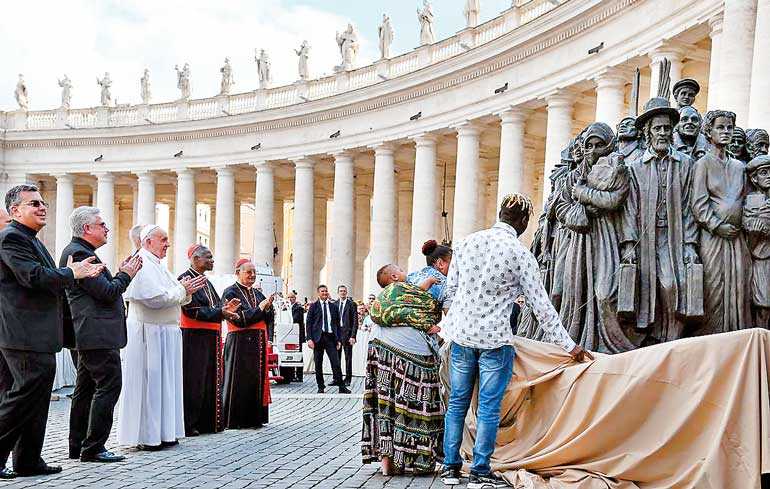Sunday Feb 22, 2026
Sunday Feb 22, 2026
Monday, 30 September 2019 00:00 - - {{hitsCtrl.values.hits}}

Pope Francis attends the unveiling of a sculpture depicting a group of migrants of various cultures and from different historic times, following a mass for World Day of Migrants and Refugees, at St. Peter's Square at the Vatican – Reuters
VATICAN CITY (Reuters): Pope Francis yesterday scolded countries that produce weapons for wars fought elsewhere and then refuse to take in refugees fleeing the very same conflicts.
The 82-year-old Argentine Pope, whose parents were of Italian immigrant stock, has made the defence of migrants and refugees a plank of his pontificate and he has often clashed over immigration policy with US President Donald Trump and populist anti-immigrant politicians in Europe.
Francis has also criticised the arms trade repeatedly and his sermon for 40,000 people in St. Peter’s Square yesterday linked the issues of war and migration as the Roman Catholic Church marked its World Day of Migrants and Refugees.
“Wars only affect some regions of the world, yet weapons of war are produced and sold in other regions which are then unwilling to take in the refugees generated by these conflicts,” Francis said.
Yesterday’s Mass was attended by many immigrants and groups helping them. It was also marked by a mix of African, Spanish and Portuguese music as well as traditional Church music.
Francis said the world is becoming increasingly “elitist and cruel towards the excluded”, adding that it is the duty of Christians to look after all those left behind in a “throwaway culture” taking root in society.
“This means being a neighbour to all those who are mistreated and abandoned on the streets of our world, soothing their wounds and bringing them to the nearest shelter, where their needs can be met,” he said.
People could not remain indifferent to “the bleak isolation, contempt and discrimination experienced by those who do not belong to ‘our’ group”, the pope said.
Francis then inaugurated a large statue in St. Peter’s Square, showing dozens of migrants and refugees from different faiths and different periods of history.